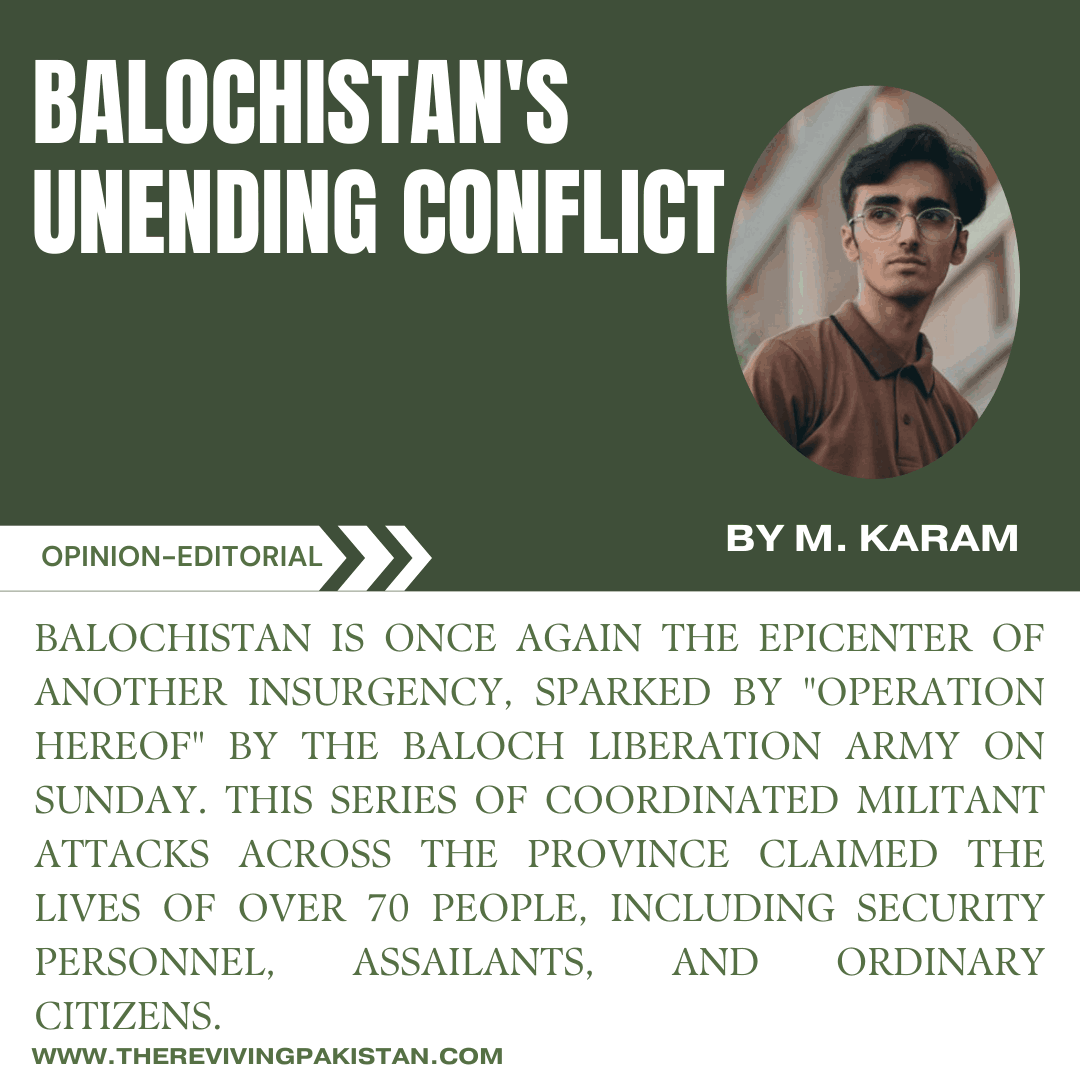About the Author(s)

Muhammad Karam
Author is a Civil Engineering graduate from NED University of Engineering and Technology (NEDUET) with a keen interest in the socio-political affairs of the world.
Balochistan is once again the epicenter of another insurgency, sparked by “Operation Hereof” by the Baloch Liberation Army on Sunday. This series of coordinated militant attacks across the province claimed the lives of over 70 people, including security personnel, assailants, and ordinary citizens. However, this resurgence of Baloch agitation is not new, given the years-long centralizing policies of the government and the violent means employed to enforce them.
When Quaid-e-Azam addressed the Bar Association in Karachi, stating, “I want the Muslims to get rid of the disease of provincialism. A nation can never make progress unless it marches in one formation,” he was acutely aware that ethnicism could become the root cause of division in this otherwise ‘unbreakable’ nation. This concern was realized in 1971 with the Fall of Dhaka. While one could argue that the Liberation of East Pakistan was partly due to geographical separation (the two provinces were divided by more than 1,600 kilometers of secular but predominantly Hindu India), the critical factor was the dissent of the people of East Pakistan against the Centre’s policies, which favored West Pakistan. This dissent was first incited by the country’s founder’s imposition of Urdu as the national language. Although the Constitution of 1956 later recognized both Urdu and Bengali as national languages, the damage had been done. The subsequent One-Unit Scheme further fueled Bengali nationalism. Yet, the elite—those who control the army and the bureaucracy—have consistently responded to such hostility with military operations and internal colonialism, exploiting both former East Pakistan and today’s Balochistan.
The exploitation of Balochistan, a province with a long history of struggle, began with the discovery of natural gas deposits near Sui and Pirkoh (both in Dera Bugti district) in 1953. These resources have been supplying cities in Punjab, such as Multan and Rawalpindi, since 1964. However, in Dera Bugti, only the main town is provided with natural gas—and this has only since the mid-1990s, following the federal government’s establishment of a paramilitary camp. The more significant issue lies in the low gas export prices and the small percentage of royalties allocated by the central government to Baluchistan, a province already owed billions of rupees in gas revenue in arrears. According to a 2013 report, the Balochistan government received only Rs. 10 billion annually out of Rs. 120 billion in arrears from the gas development surcharge. This indicates that the province has been historically underpaid, with a significant gap between what was owed and what was received.
This ill-treatment is coupled with another issue – the development of a deepwater port in Gawadar, a place to which Baloch are emotionally attached (one of their heroes Hammal Jeayand fought there a key battle against the Portuguese occupation). This remote fishing town gained a deep-sea port in the early 2000s and was announced as the southern hub of CPEC in 2014. Ever since, the economic potential of Gwadar has been the center of national and international media debates. Less discussed are the people there — and will they get their fair-share from the substantial economic activity? The answer was given by the Federal Minister for Ports and Shipping, Mir Hasil Bizenjo that, 91 per cent of the revenues to be generated from the Gwadar port as part of the China-Pakistan Economic Corridor (CPEC) would go to China. The greater resentment, however, is because of the forceful change of the demography with the inclusion of Gawadar Port City and other Housing Projects, through which the locals, quite obviously, would be “eliminated” since the Chinese are in control of half of the city and the other half is under military control.
Well, as they say, it takes two hands to clap. When the military establishment began ‘kill-and-dump operations’ to intimidate Baloch nationalists, the nationalists responded by targeting ‘foreigners,’ including Punjabis and people of other origins. According to official data, between 2013 and 2023, approximately 494 civilian deaths have been directly attributed to Baloch separatist groups. Chinese nationals have also been targeted, with significant incidents including the Bisham attack, the April 2022 attack in Karachi where three Chinese nationals were killed by a female suicide bomber from the Balochistan Liberation Army (BLA), and the July 2021 bus bombing in Khyber Pakhtunkhwa that resulted in the deaths of nine Chinese workers.”
How to end all this fiasco? In-order to ensure peace and tranquility in the region, it is imperative that political parties and the establishment acknowledge the rightful demands of the people of Balochistan. They should view them as fellow countrymen rather than insurgents or mutineers. It is essential to put an end to enforced disappearances and extrajudicial killings in the province. Furthermore, free and fair elections must be guaranteed so that any leader who comes to power is elected by the people, not selected by those in Islamabad.

